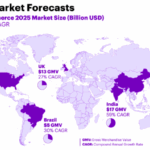Turkey’s e-commerce landscape is experiencing a period of phenomenal growth, driven by a unique blend of factors. While rising inflation undoubtedly plays a role, the Ministry of Commerce’s recent report highlights a robust underlying trend of digital adoption and consumer behavior shifts.
Surge in Online Spending
The report reveals a staggering 115% increase in e-commerce spending in Turkish liras during 2 023, reaching a total value of 1.85 trillion liras (approximately €53 billion). However, to gain a clearer picture of organic growth, it’s crucial to consider the impact of inflation, currently at 75%.
Transactions Tell a Stronger Story
A more accurate reflection of e-commerce’s true momentum comes from the significant growth in transaction volume. The number of online transactions in Turkey jumped by 22.3% in 2023, reaching 5.87 billion units. This stands in stark contrast to the stagnant or minimal growth observed in online spending across major Western European countries during the same period, as reported by Forrester.
Rising Online Share of Consumer Spending
Another indicator of Turkey’s e-commerce boom is the increasing share of online purchases within the total consumer spending landscape. Over the past four years, this share has doubled, growing from 10.1% in 2019 to 20.3% in 2023. The Ministry of Commerce acknowledges the initial boost provided by the COVID-19 pandemic, but emphasizes the sustained growth trajectory even after the pandemic subsided.
Continued Upward Trajectory Expected
The Ministry of Commerce forecasts a positive outlook for 2024, projecting an 84% increase in e-commerce spending. This translates to an estimated transaction volume of 6.67 billion, representing a 13% growth compared to 2023. This forecast surpasses the optimistic growth predictions previously made by market research firms Forrester and GlobalData for the European region.
E-commerce Landscape in Turkey
The report also sheds light on the e-commerce landscape within Turkey. Currently, there are over 559,412 companies actively registered as e-commerce businesses. The product categories with the highest turnover are white goods and household appliances, followed by electronics and clothing, footwear, and accessories. While delivery times remain an area for improvement, with an average wait time of 46.2 hours, the overall picture points towards a dynamic and rapidly evolving e-commerce ecosystem in Turkey.
Looking Ahead: A Market Poised for Continued Growth
Despite the inflationary pressures, Turkey’s e-commerce sector is experiencing a surge in activity, fueled by a combination of economic factors and a growing consumer preference for online shopping. As the market matures and delivery infrastructure improves, Turkey’s e-commerce landscape is well-positioned for continued expansion in the years to come.










